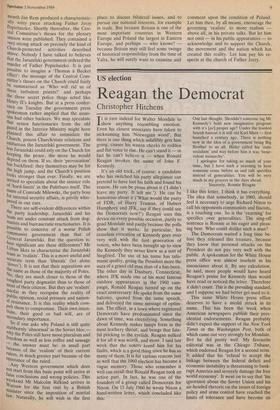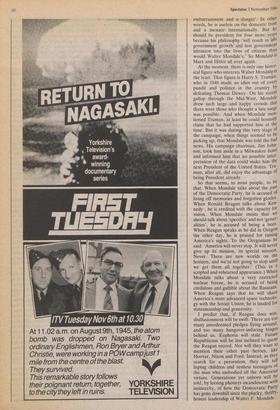US election
Reagan the Democrat
Christopher Hitchens
It is rare indeed for Walter Mondale to show anything resembling emotion. Even his closest associates have taken to nicknaming him 'Norwegian wood'. But there is one thing which infallibly gets him going, causes his waxen cheeks to redden and flat voice to rise. He can't stand it — in fact he can't believe it — when Ronald Reagan invokes the name of John F. Kennedy.
It's an old trick, of course: a candidate who has switched his party allegiance can pretend to have lost his faith and found his reason. He can be pious about it ('I didn't leave my party. It left me.'). He can be humorous about it ('What would the party of FDR, of Harry Truman, of Hubert Humphrey and JFK, say if they could see the Democrats now?') Reagan uses this device on every possible occasion, partly to goad Mondale and partly because the polls show that it works. In particular, his ceaseless evocation of Kennedy goes over very well with the first generation of voters, who have been brought up to view the Kennedy they never knew as a sort of Siegfried. The use of his name has talis- manic quality, giving the President more the aura of a grand old man than of a has-been. The other day in Danbury, Connecticut, where JFK made one of his most famous outdoor appearances in the 1960 cam- paign, Ronald Reagan turned up on the exact anniversary. He spoke from the same balcony, quoted from the same speech, and delivered the same message of optim- ism. The effect, in a town where registered Democrats have predominated since the dawn of time, was electrifying. Something about Kennedy makes lumps form in the most leathery throat, and brings that fate- ful pricking to the eyelids. Reagan milked it for all it was worth, and more. I said last week that the voters loved him for his faults, which is a good thing since he has so many of them. It is for various reasons just as well that the 1960 election has become a vague memory. Those who remember it well can recall that Ronald Reagan took an active part. In fact, he was one of the founders of a group called Democrats for Nixon. On 15 July 1960 he wrote Nixon a hand-written letter, which concluded like this: One last thought. Shouldn't someone tag Mr Kennedy's bold new imaginative program with it's (sic] proper age? Under the tousled boyish haircut it is still old Karl Marx — first launched a century ago. There is nothing new in the idea of a government being Big Brother to us all. Hitler called his 'state socialism' and way before him it was 'bene- volent monarchy'.
I apologise for taking, so much of your time, but 1 have such a yearning to hear someone come before us and talk specifics instead of generalities. You will be very much in my prayers in the days ahead.
Sincerely, Ronnie Reagan
I like this letter, I think it has everything. The idea that somebody, in 1960, should feel it necessary to urge Richard Nixon to call his opponents communists and fascists, is a touching one. So is the 'yearning' for specifics over generalities. The sing-off sentence is Ronnie at his eager and pleas- ing best. Who could dislike such a man?
The Democrats waited a long time be- fore they released this treasure, because they know that personal attacks on the President do not pay very well with the public. A spokesman for the White House press office was almost insolent in his insouciance about it. By any calculation, he said, more people would have heard Reagan's praise for Kennedy than would have read or noticed the letter. Therefore it didn't count. This is the prevailing standard, and I suppose we had better get used to it.
This same White House press office deserves to have a medal struck in its name. This has been the week when American newspapers publish their pres- idential endorsements. Reagan probably didn't expect the support of the New York Times or the Washington Post, both of which came out very strongly for Mondale. Bi't he did pretty well. My favourite editorial was in the Chicago Tribune, which endorsed Reagan for a second term. It added that his 'refusal to accept the linkage between the federal deficit and economic instability is threatening to bank- rupt America and severely damage the free world economy'. It went on to say that 'his ignorance about the Soviet Union and his air-headed rhetoric on the issues of foreign policy and arms control have reached the limits of tolerance and have become an
embarrassment and a danger'. In other words, he is useless on the domestic front and a menace internationally. But he should be president for four more years because.his philosophy 'will result in Ilks government growth and less government intrusion into the lives of citizens than would Walter Mondale's.' So Mondale'$ Marx and Hitler all over again.
At the moment, there is only one histor- ical figure who interests Walter Mondalain the least. That figure is Harry S. Truman, who in 1948 made an idiot out of every pundit and pollster. in the country by defeating Thomas Dewey. On his recent gallop through the Mid-West, Mondale drew such large and happy crowds that there were those who thought a late surge was possible. And when Mondale men- tioned Truman, at least he could honestly claim that he had supported him at the time. But it was during this very stage of the campaign, when things seemed to be picking up, that Mondale was told the bad news. His campaign chairman, Jim John- son, took him aside in a Milwaukee hotel and informed him that no possible inter- pretation of the data could make him the next President of the United States. Tru- man, after all, did enjoy the advantage of being President already.
So that seems, to most people, to be that. When Mondale talks about the past of the Democratic Party, he is accused of living off memories and forgotten glories. When Ronald Reagan talks about Ken- nedy , he is credited with the capacity for vision. When Mondale insists that we should talk about 'specifics' and not 'gener- alities', he is accused of being a bore. When Reagan speaks as he did in Oregon the other day, he is praised for raising America's sights. To the Oregonians he said: 'America will never stop. It will never give up its mission, its special mission. Never. There are new worlds on the horizon, and we're not going to stop until we get them all together.' (This in a scripted and rehearsed appearance.) When Mondale talks about a very restricted nuclear freeze, he is accused of being credulous and gullible about the Russians. When Reagan says that he will share America's most advanced space technolo- gy with the Soviet Union, he is lauded for statesmanship and generosity.
I predict that, if Reagan does win, disillusionment will be swift. There are too many unredeemed pledges flying around, and too many hangover-inducing binges behind us. Euphoria will stale. Future Republicans will be less inclined to quote the Reagan record. Nor will they want to mention their other past heroes, like Hoover, Nixon and Ford. Instead, is they search for a peroration, they will tell lisping children and restless teenagers of the man who embodied all the American virtues. Generations yet unborn will be told, by leering phoneys incandescent with insincerity, of how the Democratic Party has gone downhill since the plucky, thrifty, honest leadership of Walter F. Mondale.











































 Previous page
Previous page